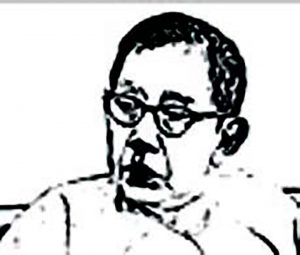9 October
I have made frequent trips to Rakhine since 2016. I traveled there as part of the Maungtaw Investigation Commission led by Vice President U Myint Swe after the conflicts that occurred in Maungtaw Region in 2016. I have also visited the region for socioeconomic research programmes during my tenure at the Institute of Economics. I collected information at various villages and collaborated with the pearl and fishery associations as well. Then when the UEHRD was formed in 2017, I made more visits as its Chief Coordinator and also as part of the Independent Investigation Commission. Personally, I have also visited Sittway and MraukU with my family.
Meeting with businesses in Sittway
This was different from past visits as I was meeting with private businesses in Sittway. I had recently been acquainted with U Soe Paing, Chairman of a public company in Rakhine, during an investment forum in Bangkok.
Now, as I was both a researcher and lecturer on public companies, one established in Rakhine State intrigued me. I had gotten in contact with U Soe Paing last month and arranged for a seminar in Sittway. We chose a date I was available but U Soe Paing had to go abroad that day so my assistance, Ko Lu Aye, had to organize everything with the officials.
Joining me in that seminar were UMFCCI Secretary-General U Aung Kyi Soe, the leader of Rakhine Ethnic Myanmar Innovators Association U Tun Tun Naing, and U Zaw Min Thein, founder of the Rakhine State football team. We notified State Chief Minister U Nyi Pu of the meeting and seminar as well.
Exchanging perspectives
I flew to Sittway in the early morning to get more time. Ko Lu Aye was waiting for me at the airport with the Chairman of the Rakhine Chambers of Commerce, the Chairman of the Rakhine Ethnic Entrepreneurs Association and other officials.
We went to the SS Restaurant near the beach and had Rakhine mont-di (rice vermicelli mixed with thin soup). I quite enjoyed the mont-di as it was very delicious as well. We held our meeting at the restaurant after we finished our meal.
We explained the motive behind our visit and urged them to honestly put up the actual facts. The attendees were experienced business people consisting of individual company owners, conglomerates and public companies who have practical experience.
We listened to them and exchanged opinions. We had the opportunity to learn what the actual people in the field were facing. I was happy with their honesty and trust. U Aung Kyi Soe and U Tun Tun Naing shared their views and assumptions with them too. When my turn to speak came up, I urged them to envision how they want Rakhine State to look like in the next 20 to 25 years.
The Rakhine issue is currently the biggest difficulty challenging our nation. We are facing different forms of international pressure. Human rights issues, economic issues, social issues and political issues. The Union Government is working hard towards resolving these issues. The different ministries are taking action as well. And State Counsellor Daw Aung San Suu Kyi is leading the UERHD and has received the support from the business community.
As I was assigned to the task, I regulated negotiations with the business people. And I still am. We need to unveil objectives for the future when doing so.
The dream for Rakhine
An attendee shared a dream they had since the formation of the UEHRD. It was about realizing the Kanyinchaung Economic Zone. The State Government was trying its best to achieve it. They are planning to open it in the coming month of December.
I want Maungtaw to become a border trade zone like Muse and Myawaddy. People only think of conflict when Maungtaw is mentioned but it is already engaging in trade with neighboring countries.
They talked about developing the private sector and implementing a good administration system in companies into different sections. The truth is Rakhine already has sound economic foundations. It is also geographically strategic. I urged for good corporate governance in public companies during the second part of my talk.
Good corporate governance
The Government during former President U Thein Sein’s term urged for establishment of public companies. They encouraged it greatly. That is why public companies were uncovered and established everywhere. They spread like wild mushrooms.
There are a total of 200 public companies now. But despite the large number, there wasn’t any good corporate governance system. Only a few people were well-trained in administration.
Recently, a group was formed to provide training courses for director-level personnel. The basis of good administration is differentiating between assets and administration.
I had serious discussions with the State Chief Minister and officials on providing training courses to systematically develop the public companies formed or based in Rakhine State. We would also require the assistance of UMFCCI.
We must fix the zealous attitude in our nation with a more systematic approach. It’s not enough for them to be many public companies. We must go from there to the stock exchange market. There are six registered companies in Yangon’s stock exchange but more need to come in. Only then will an investment market form in Myanmar.
Rakhine’s future depends on multi-sectoral development
I am pleased with this trip to Sittway. I want to help with Rakhine’s issues from the experience of my full understanding. We especially need to gather the strength of the private sector.
The future of the entirety of Rakhine State depends on how far its political, economic and social development reaches. We need to nurture it to become a region filled with peace and prosperity. And I believe we can make it so.
By Prof Dr Aung Tun Thet
(Translated by Pen Dali)



